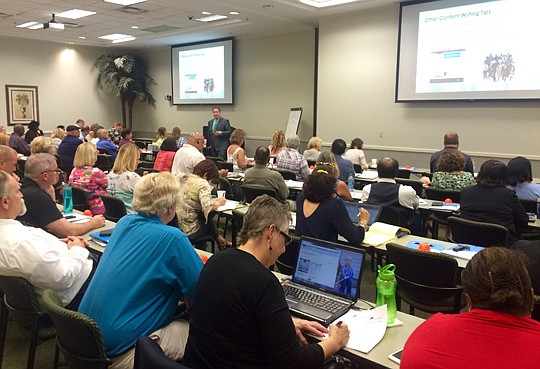
By Jamie Swann, Contributing Writer
In the age of the internet, not having a web presence is an unfortunate mistake made by many agents.
Even more unfortunate is having an unprofessional internet presence that is not functional for the purpose of selling homes.
When Realtor Cory McKibben began his new career last March at Keller Williams First Coast Realty’s North Florida Home Team, he was assigned a standard form to fill out to create a website.
Filling in the blanks, McKibben was taking the first steps to creating a link between himself and potential clients.
“In today’s market, buyers are viewing homes on the internet before viewing them in person,” said McKibben. “I want my site to be a go-to tool for buyers, but distinguishing my Keller Williams site from other agents is difficult.”
A successful website should be a professional representation of the agent.
But, if agents are in a crunch, using the website provided by the office will do the trick — with a few minor adjustments.
First and foremost, update the “about me” information page. People want to know who they are working with and a majority of the time, they will want to know this before meeting an agent.
Potential clients want to know what makes an agent different from others, why he or she likes selling real estate and what the agent can do for them.
Using canned content or general “about me” content won’t do that, so take the time to do it right.
After that information has been updated, agents should review the amount of pages on their website.
Are they all necessary? Less is more when it comes to websites. People don’t have time to look at everything –– and they won’t. So keep only the important pages.
“Too many pages on a website will turn people away,” said Craig Grant, the so-called Real Estate Tech Guru, at a recent Northeast Florida Association of Realtors seminar on running a successful website.
“It will leave clients feeling overwhelmed, like they don’t have enough time to view everything, so they’ll leave,” he said.
Time is money — and that includes time spent browsing a site. Don’t waste it.
When someone visits a website, make it easy for them to find what they’re looking for.
This means that most of the content should be visible or accessible from the home page. It also means information on the site is relevant and useful to the prospective buyer or seller.
Other items to keep in mind are the colors and the fonts.
Stick to one or two main colors for a website. Too many colors are distracting for readers and make them want to click away from the site.
Font styles are always changing, which is why it is a good idea to update the font on a website.
It’s hard to imagine a font would go out of style, but who really uses Times New Roman anymore?
New fonts can update a page and give it a modern feel with making very few changes.
“Use colors that are found in your geographic region,” suggested Grant. “Whatever you do, never, ever use pink. Studies show men are more likely to leave a page if the color pink is used throughout the page.”
Make sure the contact information is up to date and the email forms are working.
The best place to put a contact phone number is in the top right corner of the website. But, no matter where the contact information is located, make sure it is easy to spot.
Don’t miss out on leads because the phone number was buried in the clutter on the page.
Keeping the content of a website “fresh” is important. Fresh content is more interesting to visitors and to search engines. Set aside a specific time each week to review and maintain the website’s content and structure.
Outdated information, whether in a blog or in listings, can lead to confusion from prospective clients and will also put a website lower on search engine results.
“It’s all about getting — and keeping — your name out there,” said McKibben. “The benefits to updating routinely are immense. New content on your site means higher search engine rankings.”